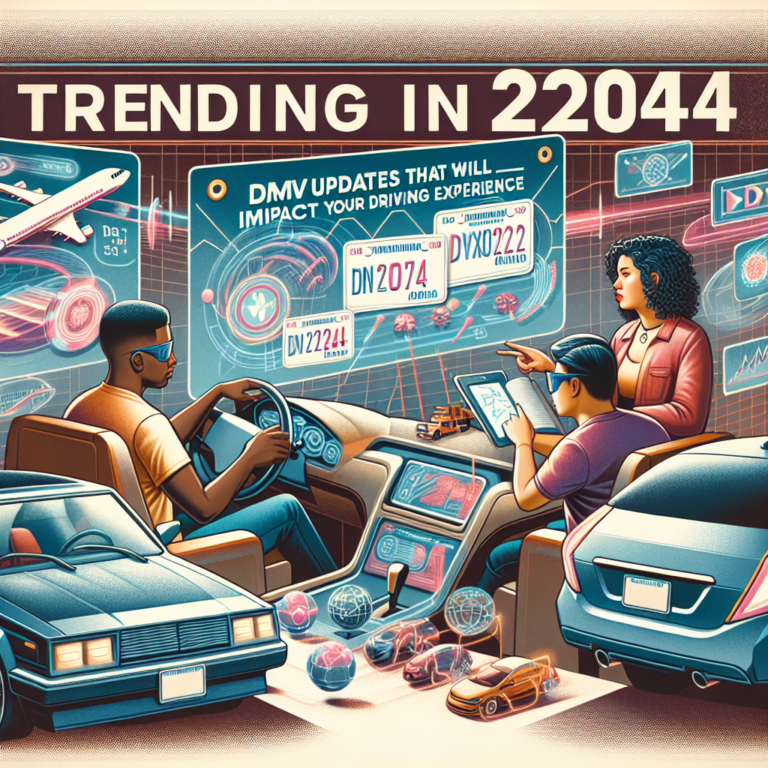As we move into 2024, state Departments of Motor Vehicles (DMVs) across the United States are rolling out a variety of updates designed to enhance the driving experience, streamline services, and prioritize public safety. Here’s a look at the most significant DMV changes and trends that are set to impact drivers this year.
1. Enhanced Digital Services
The shift towards digital services, propelled by the pandemic, is continuing to gain momentum in 2024. Many DMVs are enhancing their online platforms to allow for more comprehensive service offerings. This includes:
-
Online License Renewals: More states are providing opportunities for residents to renew their driver’s licenses online, reducing the need for in-person visits. These services may now include biometric options or updated identity verification technologies to streamline the process even further.
-
Mobile Apps: Several DMVs are launching or upgrading mobile applications that enable users to manage their driving records, schedule appointments, and receive alerts about renewals and important updates directly on their smartphones.
- Virtual Wait Times: New systems are being implemented that allow drivers to monitor wait times at their local DMV offices through real-time digital updates. This will help reduce long hours spent in queues, making the experience more convenient.
2. Introduction of Autonomous Vehicle Regulations
As autonomous vehicle (AV) technology continues to evolve, DMVs are poised to introduce new regulations in 2024. These regulations aim to ensure the safe integration of AVs into public roads. Key changes might include:
-
Licensing for AV Manufacturers: States are starting to require manufacturers to apply for licenses to operate autonomous vehicles, incorporating safety standards and testing requirements.
-
Insurance and Liability Guidelines: Updates will clarify insurance requirements for owners of autonomous vehicles and outline scenarios for liability in case of accidents.
- Public Education Campaigns: To increase awareness and understanding of AV technology, many states will implement educational programs aimed at helping drivers understand how to interact safely with autonomous vehicles.
3. Stricter Compliance and Identification Standards
In tandem with the growing presence of digital services, DMVs are tightening compliance and identification standards, focusing on identity verification.
-
Real ID Compliance: As the deadline for Real ID compliance edges closer, states are ramping up efforts to inform residents about the importance of obtaining a Real ID. This advanced identification will be necessary for air travel and accessing federal facilities.
- Facial Recognition Technology: Some states are adopting facial recognition technology to enhance the security of licensing processes. While this aims to reduce identity fraud, it has sparked ongoing discussions about privacy and data protection.
4. Electric Vehicle Incentives and Infrastructure
With the U.S. accelerating its transition towards electric vehicles (EVs), DMVs are adapting their policies to support this shift.
-
EV Registration Incentives: Several states are rolling out incentives for EV owners that may include reduced registration fees or tax credits to encourage the adoption of electric vehicles.
- Infrastructure Development: Alongside registration benefits, many DMVs are collaborating with state departments to create a robust network of EV charging stations, making it convenient for drivers to access charging points on the go.
5. Telehealth and Driver Fitness Evaluations
An emerging trend in 2024 is the recognition of driver health and wellness in licensing requirements. This includes:
-
Telehealth Options for Medical Evaluations: Drivers with medical conditions that could impair their ability to drive may be allowed to complete evaluations through telehealth services, streamlining the process and making it more accessible.
- Educational Resources: States are providing educational resources about safe driving practices, especially for older adults or those with health challenges, emphasizing the importance of assessing one’s own driving ability regularly.
Conclusion
The changes at DMVs across the country in 2024 are set to make the driving experience more efficient, secure, and aligned with modern technological advancements. Drivers can expect a shift toward convenience with enhanced digital services, heightened safety through improved regulations for autonomous vehicles and health considerations, and encouragement towards a greener future with electric vehicle incentives. Staying informed about these developments will be key for drivers as they navigate the evolving landscape of road transportation.


